 Petzlover
PetzloverJamthund is originated from Sweden but Turnspit Dog is originated from United Kingdom. Jamthund may grow 35 cm / 14 inches higher than Turnspit Dog. Jamthund may weigh 21 kg / 47 pounds more than Turnspit Dog. Both Jamthund and Turnspit Dog has almost same life span. Jamthund may have more litter size than Turnspit Dog. Jamthund requires Moderate Maintenance. But Turnspit Dog requires Low Maintenance
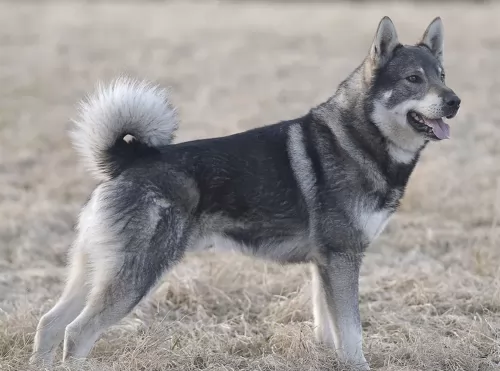 Known also as the Swedish Elkhound or Swedish Moosehound, the Jämthund is a dog which hails from Sweden, and more specifically from a region known as Jamtland.
Known also as the Swedish Elkhound or Swedish Moosehound, the Jämthund is a dog which hails from Sweden, and more specifically from a region known as Jamtland.
The dog received official recognition in 1946 as a dog breed from the Swedish Kennel Club. DNA testing tell us that these dogs originated from the crossing of a wolf, being described as a ‘Spitz-type dog’.
They were once used to pull sleds, and its why today he is an energetic dog, requiring a good dose of exercise and activities from his owners. The UKC accepted the dog as an official breed in 2006.
It is amazing that this small dog’s popularity comes from him being used in the kitchens to roast meat. The British enjoyed eating their meat which they roasted on a fire.
These dogs were essentially regarded as a tool – a means to an end, and when kitchens were modernized, they were no longer needed, and they became extinct.
Referred to as the kitchen dog or cooking dog, the first mention of these little dogs was made in 1576. By 1850 the dogs had become scarce and by 1900 it seemed as though there were none left.
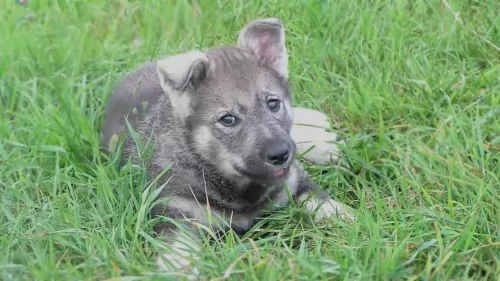 Described as a medium to large sized dog, the Jamthund stands at about 52 – 65cm in height, both males and females, and they weigh in at about 25 to 35 kilograms.
Described as a medium to large sized dog, the Jamthund stands at about 52 – 65cm in height, both males and females, and they weigh in at about 25 to 35 kilograms.
They have that typical Spitz-dog tail which curls over the back of the dog. When relaxed the tail hangs straight down. He has erect ears with a longish muzzle, much like a wolf, and his double coat lies fairly close to the body while on certain areas of the body, such as around the neck and tail, it is longer.
The color of his coat is usually light or dark grey with some cream marking around the muzzle, eyes, legs and paws. This fairly large, Spitz-type dog is certainly an attractive dog that while looking similar to a wolf shares some physical features with the Norwegian Elkhound.
Capable of being a splendid family pet, the Jamthund is an affectionate, loyal dog with his human family, although it is true that some of him hankers back to his hunting days.
He is an intelligent, amicable dog, and therefore training and socializing him is easy as he wants to please.
He is very energetic and won't be content with a life curled up indoors. He wants to be busy and involved with all your activities such as walks, hikes and swimming. He has a thick coat and he loves wintry weather, so the cold won’t stop him from wanting a long walk every day.
The Turnspit was a small long-bodied dog, standing at between 20 to 30cm in height and probably weighed anything between 9 and 14kg in height.
The legs were somewhat crooked or bandy and Edward Jesse, who wrote ‘Anecdote of Dogs’ in 1846 described them as ugly dogs with a miserable look to them. That was probably due to him having to fit into the hamster-like wheel contraption that turned the meat being roasted in the kitchens.
They were low-bodied dogs, similar to a Dachshund or a Corgi with short, stocky legs, short floppy ears, and a short coat. The long tail curled over its back. It is believed that the coats were white, reddish-brown, gray or black.
The dog was certainly feisty, energetic and hard-working with not much being written about his temperament. He was a working dog, but given the chance, he would no doubt have been loving and loyal, longing for the chance just to be part of a human family and to be loved.
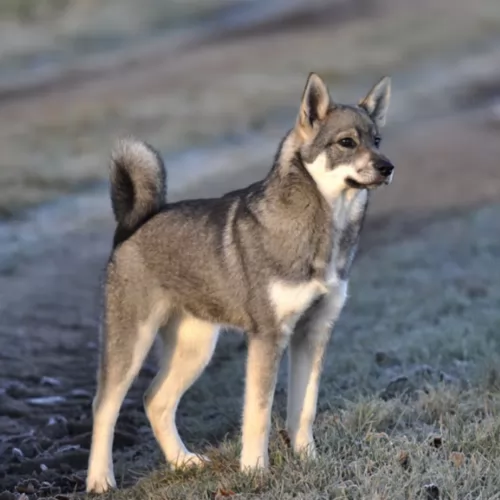 Loving the company of his human family, the Jamthund gets lonely, bored and frustrated if he is put into the backyard as a watchdog and left. When he becomes naughty it is because he is trying to tell you that he wants to be part of your life.
Loving the company of his human family, the Jamthund gets lonely, bored and frustrated if he is put into the backyard as a watchdog and left. When he becomes naughty it is because he is trying to tell you that he wants to be part of your life.
The Jämthund has excellent hunting skills and with his great intelligence too and his ability to learn easily, he makes a popular pet. He also has other attractive characteristics such as being brave and calm.
He forms a deep bond with his human family and his gentle nature makes him a favorite playmate of children too. They make good guard dogs as they are alert and protective of their human family.
Not only has the Jamthund got many positive characteristics to his name, he is an attractive dog too, and once you've brought one into your home you'll realize what a wonderful dimension it brings into your home and your life.
The Turnspit dog had a tough life, but would no doubt have made a wonderful little pet had he just been allowed to be a companion dog.
Make sure that when you buy a dog, you don't just put him in your backyard and forget about him. Give him the love and care he deserves.
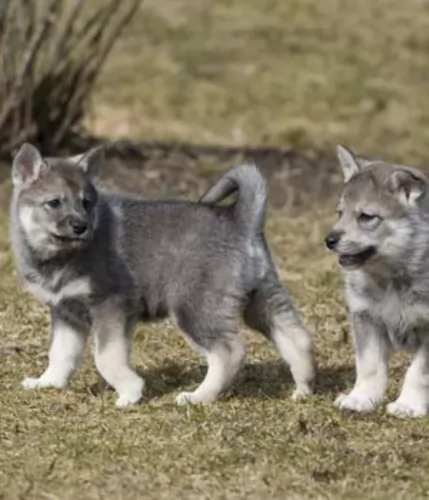 While the Jämthund is a healthy dog breed and won't cost you much in veterinary bills when it comes to illness, there are some common dog illnesses that are worth knowing about so you can respond in time to his need.
While the Jämthund is a healthy dog breed and won't cost you much in veterinary bills when it comes to illness, there are some common dog illnesses that are worth knowing about so you can respond in time to his need.
Unfortunately this is a joint problem that can affect even young dogs. The hip joint hasn't formed properly and it can lead to the development of painful arthritis. It can be a debilitating disease for your dog and you will need to see your vet.
This may seem like a trivial kind of dog illness but in fact it can lead to a lot of frustration, pain, anguish and discomfort for your pet. Signs of a skin allergy can include red, inflamed skin, itchiness, pain and oozing sores where your pet licks away miserably at the affected areas.
The health and lifespan of a dog is influenced by quite a few things such as food, care, love, exercise and the type of breed it is. Generally smaller dogs live longer than big dogs, and mixed breed dogs live longer than pure breeds.
The Turnspit dog, if he had received the proper care, could have lived to between 10 and 15 years of age.
Stress can bring on a sudden drop in blood sugar. The Turnspit had reason to be stressed, working hard in horrible conditions. Dogs become weak and lethargic and can scarcely maintain an even gait. A sudden drop in blood sugar can cause a small dog to go into a fatal coma.
This ailment seems to occur more often with smaller dogs. The pancreas becomes inflamed and your dog has vomiting, diarrhea, abdominal pain and dehydration. Pancreatitis can come about because of trauma, metabolic disorders or infection.
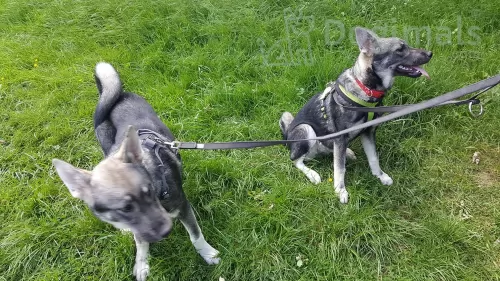 Your Jamthund is a high energy dog and because of his background of hunting and pulling sleds, he loves wide open spaces where he can run. He essentially suits country life and it wouldn't be wise to confine this energetic dog to a small home.
Your Jamthund is a high energy dog and because of his background of hunting and pulling sleds, he loves wide open spaces where he can run. He essentially suits country life and it wouldn't be wise to confine this energetic dog to a small home.
Brushing the thick coat twice a week will keep it in top condition.Keep his nails trimmed and also keep an eye on his teeth. Find out how to make use of canine toothbrush and toothpaste to keep his teeth clean and free of plaque.
Such a high energy dog requires the very best food packed full of vitamins and minerals. Look for the best commercially manufactured food there is and add in some wholesome home-made food from time to time such as cooked chicken, rice and vegetables as well as some raw meat occasionally. He must have a constant supply of fresh, cool water.
A dog is man's best friend, but the Turnspit was essentially just a working dog and most likely didn’t receive the proper care he deserved.
Small dogs like these would have had basic needs. Their owners would have had to pay attention to the dog's health, because he needed to work.
We look at ways in which a small dog like the Turnspit should have been cared for -
One wonders if the Turnspit was allowed to eat any of the roast meat he worked so hard on to get ready. Every dog should have a regular meal.
Most adult dogs should be fed 2 meals of kibble a day. If the Turnspit wasn’t extinct he would have required a high quality ‘small dog breed’ commercial dog food. Home-made food would also be a requirement – some boiled chicken, brown rice and vegetables. Dogs want and appreciate simple, wholesome foods that won’t upset their digestive systems.
Along with good food, dogs need cool, fresh water constantly available to stay healthy.
Make sure he gets to the veterinarian if he is sick, but also for his vaccines to prevent him from getting some of the worst dog diseases there are.
Groom your small dog regularly. The Turnspit had a shortish coat and would have required a brush twice a week. Other grooming procedures for a small dog like the Turnspit would have been keeping his nails trimmed and checking the inside of his ears and his mouth for ear infections and dental disease.